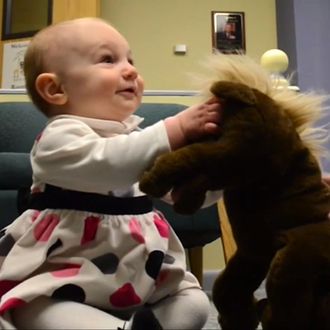
If you’re a baby, the world is constantly throwing a lot of new stuff at you. The question of how infants instinctively decide which stimuli to focus on, and how they process what they’re experiencing into new knowledge or new skills, has long interested psychologists. One of the most consistent findings across this line of research has been that babies pay special attention when something surprises them — when a familiar object acts in an unfamiliar way, for example, or when an object is jury-rigged by researchers to appear to violate the laws of physics (this should be obvious to anyone who has ever played peek-a-boo with an entranced infant).
In a new study published in Science, Aimee E. Stahl and Lisa Feigenson of Johns Hopkins University find that this element of surprise plays an important role in learning. The researchers conducted four experiments in which they surprised infants in different ways and then tracked how this surprise affected their ability to learn new things (for instance, that a toy squeaked) in the immediate wake of that surprise.
As the researchers suspected, when an object surprised the infants, they were generally more curious about it, and quicker to learn its secrets. In the paper’s conclusion, Stahl and Feigenson write:
[H]aving expectations violated changes the way infants learn. Much as scientists faced with unexpected patterns of data are propelled to think harder, run further experiments, or change their methods of inquiry, untutored preverbal minds are sensitive to conflict between the predicted and the observed, and use this conflict to scaffold new learning.
JHU released a video explaining the experiments that’s worth watching, and only partly because it involves cute babies looking confused and surprised:
The usual caveats apply here — you can’t take a single study that was conducted in a controlled baby lab and make sweeping real-world statements about it. But this is still a really interesting step forward in understanding how babies learn, and given the massive market for products geared at baby brains (many of which are basically worthless, haven’t been rigorously tested, or both), it’s easy to see how Stahl and Feigenson’s findings could trickle down to useful products and ideas in the near future.
Surprising babies: both adorable and educational.




